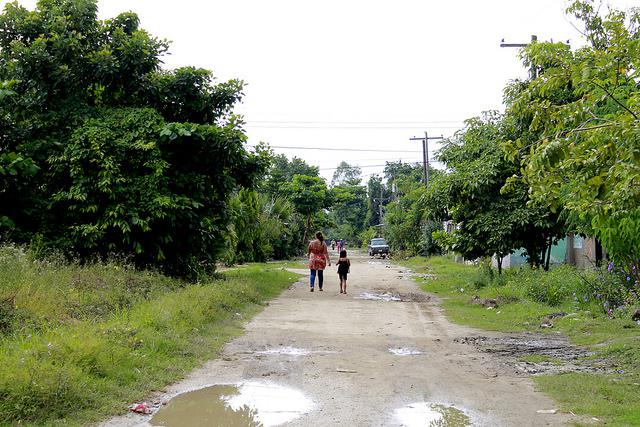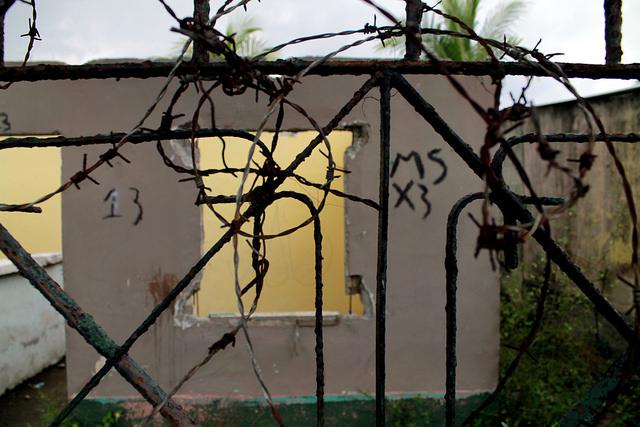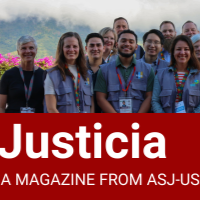In San Pedro Sula, they found a different context and different challenges. San Pedro Sula is the most violent city in Honduras, and ASJ works in the most violent region of the city – Rivera Hernández, a sprawling conglomeration of about 40 smaller communities. As many as seven different gangs battle over this territory. In 2013, the year before ASJ started working in the community, there were 193 murders registered – over twice as high as Honduras’ average, and 30 times higher than the global average.
October 26, 2016
Hector* can point to the exact place where one gang territory ends and the other begins. It’s an ordinary-looking lamppost on the corner of a street that doesn’t look any different than other streets in Rivera Hernández, a sector of the Honduran city San Pedro Sula.
Cross this invisible border, however, and you could be killed by gang members defending their territory. Hector knows of bodies shot and left there, visible reminders of the conflict this neighborhood suffers.
Dozens of borders like this crisscross San Pedro Sula, where Hector works as a criminal investigator with the Association for a More Just Society (ASJ, formerly known as AJS). After over ten years with the Honduran police force, he left to join the Peace and Justice Project, working alongside ASJ lawyers and psychologists to support Honduran police and courts in gathering evidence, encouraging witnesses to testify, and arguing cases in court so that murderers are actually caught, convicted, and sent to prison.
The Peace and Justice project is one of ASJ’s longest-running projects. The first three-member team began in Nueva Suyapa in Tegucigalpa in 2005, when the neighborhood was one of the capital’s most violent. Since 2005, ASJ has seen a dramatic reduction in homicides, mostly because of the reduced impunity in the zone. After moving to four different communities in Tegucigalpa, ASJ opened a second, smaller office in San Pedro Sula, Honduras’ second-biggest city, to continue their work.
Despite this high murder rate, investigation of violent crimes was nearly nonexistent.
In 2013, the Honduran police had only advanced with four cases of the 193 total. In all four of these cases, the police had stumbled across the murderer in the act. Any case that required investigation was added to an impossible backlog of cases that were noted, filed, and forgotten.
In a rented car with tinted windows, followed by two police officers on a motorcycle, Hector enters a community that is one of the hotbeds of violence in Rivera Hernández. The wide, paved streets turn to pitted dirt roads a few hundred yards in.
For now, the streets are peaceful – but at the cost of dozens of unwritten rules. Businesses pay a weekly “war tax” to the gangs or risk violence or death. Around 8 pm, soon after the sun goes down, people return to their homes and shut their doors. People don’t leave their neighborhoods; they don’t cross the invisible boundary lines.
Pressure from gang members has forced many businesses to close – either from fear or an inability to continue paying the weekly “tax”.
In one community, a man with a gun entered the local church and threatened attendees. Now, says one community member, “Even the churches have closed their doors.”
Sandra* is one woman who achieved justice through partnership with ASJ. Sandra has lived in Rivera Hernández for 18 years, long enough for violence to become part of her daily life.
Everyone, she says, has experienced violence. “And everyone keeps walking,” Sandra says, “close your mouth, close your ears, keep them closed.”
This mantra, the same one she had taught to her children and grandchildren, no longer made sense to her when she saw her husband shot for no reason other than being in the wrong place at the wrong time.
When she met an ASJ psychologist and investigator, she told them almost immediately that she would testify, “I can’t stay here with my mouth closed,” she told them, “If I don’t speak, they will continue to kill innocent people.”
She didn’t trust the police to take her report, but she trusted the psychologist who worked with her. When he showed her a picture of suspects that had been captured, she didn’t hesitate – “Those are the men who killed my husband,” she said.
Now she would have to testify against them – a brave action that could mean death if the wrong people discovered what she was doing.
At first, Sandra was scared to witness, but ASJ supported her by assuring that as a “protected witness” she really would be protected. They transported her to and from court, ensured that she had the long black robes that would hide her face and body in court, and even a voice distorter to change her voice.
With this protection, Sandra felt she could speak out. “When I saw [the man who killed my husband], I felt rage,” she said, but she kept herself calm enough to clearly give her testimony.
Thanks to her bravery, the men were convicted.
“I feel good because they won’t hurt someone else, another innocent person,” Sandra says. The knowledge won’t bring back her husband, but it is a comfort.
In the two years ASJ has been working in the neighborhood, homicide rates in Rivera Hernández have dropped by 55% – from 193 murders in 2013 to 87 in 2015. Rivera Hernández remains a violent place, but over 100 fewer people have lost their lives each year since ASJ’s involvement. That’s 100 husbands, fathers, sisters, and neighbors who will continue to work, support their families, and bit by bit make their community a safer place.
In the face of so much violence, ASJ employees feel a complicated mix of realism and hope. They know that Rivera Hernández is one part of one city in the country of Honduras, where tens of thousands of murders occur every year. But they also know that their work as “a lever to get the process going” is strengthening the judicial system across the country.
For people who deal daily with the most horrifying violence, they can all mention reasons to continue.
“I don’t expect to see the Promised Land,” the coordinator of the project said, grinning wistfully, “but maybe my children…”
They all believe the future can be different, and visiting Rivera Hernández, it’s hard not to get a glimpse of that hope.
Through an abandoned, gutted house, spray-painted with gang symbols, children from the neighborhood run, playing. They are more than their violent surroundings, more than other grave predictions or statistics – they are a better future, and the empty house echoes with their laughter.



















